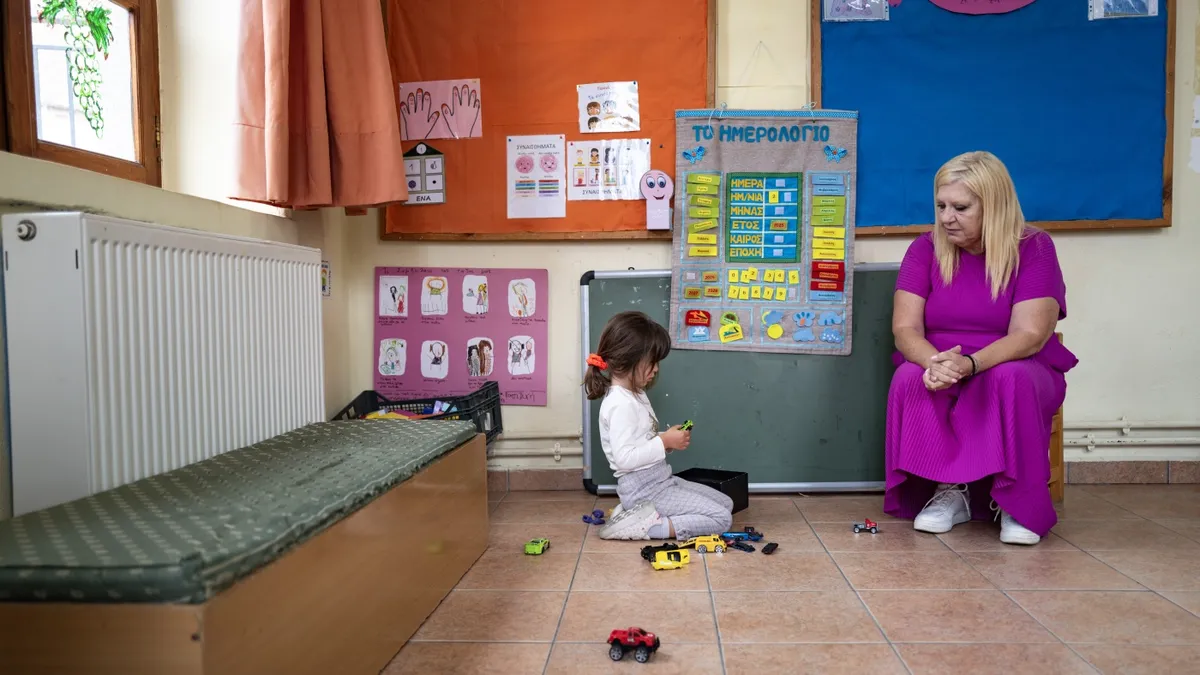
In recent years, families in the U.S. and around the globe have been making the conscious decision to have fewer children. This significant shift in family planning is examined in NPR's enlightening series, Population Shift: How Smaller Families Are Changing the World. The series delves into the various causes and implications of this emerging trend, revealing a profound transformation in societal norms and personal choices.
The school day is just beginning for 4-year-old Vasiliki Vourgou, a spirited girl with dark eyes and a bright pink scrunchie holding her hair back. Today, she sits alone in her small classroom on the picturesque Greek island of Lemnos. Usually, there are two students attending this quaint school, but with one child sick, it’s just Vasiliki going through the morning routine with her dedicated teacher, Maria Kokkinopliti. On days with pleasant weather, Kokkinopliti tries to take the students outside to interact with older children, enriching their social experiences.
Lemnos, situated in the northern Aegean Sea, is home to approximately 16,000 residents scattered across small villages. Vasiliki’s school in the village of Thanos exemplifies a broader trend in Greece, where many educational institutions face declining student enrollment. As younger generations migrate to urban areas in search of better opportunities, those who remain are often having fewer children. Vasiliki's father, Stelios Vourgos, is a shepherd who works long hours but cherishes raising his family on the island he loves. “Here, I fell in love with my wife; here is my job,” Vourgos expressed through an interpreter. He views the island as a paradise for children, contrasting it with the chaotic nature of big cities.
Despite the idyllic setting, the challenges facing rural communities like Thanos are daunting. Vourgos recalls that the primary school in his wife’s childhood village was closed decades ago, and he fears the same fate may await Vasiliki's school. He notes, “Without a thriving school, there won't be much left here.” The declining birthrate in Greece, currently at about 1.3 births per woman, is significantly below the 2.1 level necessary for maintaining a stable population. This trend is particularly acute in rural areas, where many schools are shutting down, with over 700 closures announced by the education ministry this year alone, representing about 5% of the nation’s schools.
The situation is further complicated by limited healthcare services on the island. Vourgos shared that he and his wife incurred substantial costs traveling for medical care during her pregnancies. Dr. Olga Katira, a pediatrician on Lemnos, has observed a decline in births, noting, “We used to have six, seven newborns per month, and now we have three.” This demographic shift raises concerns not just for local communities but for the future of Greece as a whole.
Since the early 1950s, Lemnos' population has decreased by more than a third, from over 27,000 residents to roughly 16,000 today. Mayor Eleonora Georga highlights the shuttered schools as a visible sign of this decline, stating, “It's the contemporary lifestyle of the people nowadays. They're not choosing to create families anymore.” In an effort to combat this low birthrate, the Greek government has introduced new tax incentives aimed at encouraging family growth.
Georga also pointed out the potential impact of immigration on the island's future. With increasing numbers of migrants arriving from Eastern Europe, Africa, and the Middle East, she expressed a preference for attracting Greeks who have left the country to return home. Local principal Angelos Vlapas shares similar sentiments, acknowledging the contributions of immigrants while expressing concerns about preserving Greek identity.
According to Alexandra Tragaki, a professor of economic demography at Harokopio University, the declining birthrate is partly attributable to changing roles for women in the workforce. “Women changed roles, but no one else did,” Tragaki explained, noting that while women have taken on additional responsibilities, societal expectations for men and broader support systems have not evolved accordingly. This imbalance often leads to a reduction in family size.
On the small island of Fourni, which is nearly 200 miles southeast of Lemnos, local elders such as Parthenios Flytzanis and Nikolaos Amorgianos express concerns about the future of Greece. “In 10 years, Greece will be a country of old people,” Amorgianos warned. They believe that younger generations are prioritizing different values, with many more focused on leisure activities than raising families.
For those who wish to have children but face obstacles, initiatives like HOPEgenesis offer vital support. This Athens-based nonprofit provides financial assistance for medical care and transportation for pregnant women from small islands. Katerina Vrana, a resident of the smaller island of Thymaina, shared her positive experience with the organization, which enabled her to have a third child despite the high costs of healthcare.
While Vrana and her husband navigate the challenges of raising their children on a small island, they face logistical hurdles like traveling to Fourni for schooling. Young residents like Georgia Gramatikou enjoy the peacefulness of island life but recognize the lack of opportunities as a significant deterrent to remaining there long-term.
Despite the challenges of modern life and declining birth rates, local business owner Dimitris Markakis remains optimistic. He believes that the strong spirit of the Greek people will prevail, stating, “I am optimistic.” As families continue to adapt to changing circumstances and societal expectations, the conversation surrounding family life and population dynamics in Greece remains vital.